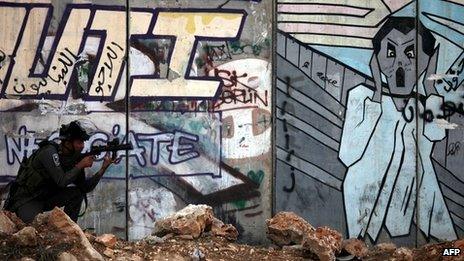What do rockets in skies over Israel portend?
- Published
- comments

The firing on Thursday of two Fajr-5 missiles from Gaza towards Tel Aviv, followed on Friday by the targeting of Jerusalem with an as yet unidentified rocket type, is a potent sign of altered strategic realities in the Middle East.
It may also prove to have been a new milestone on the road away from a comprehensive solution to the Israeli-Palestinian issue and towards perpetual instability in the region.
As for the rockets themselves, they landed without harming anyone and the fact that air raid sirens sounded in Tel Aviv for the first time since Saddam Hussein's Scud missile attacks of 1991 is something of a red herring.
The really significant developments are the ability of Israel's most implacable enemies (Hamas in Gaza and Hezbollah in southern Lebanon) to bombard its populated centre, and the emergence of Gaza as a semi-independent entity able to garner both diplomatic and materiel support.
It has been apparent since the 2006 Lebanon war, when Hezbollah rained thousands of rockets down on northern Israel, that Israel's old calculations about using buffer zones to ensure the security of its citizens were pretty much redundant.
Now it is clear that the old notions that dominated military thinking there for decades, about retaining the lands conquered in 1967 for "strategic depth", no longer apply.
During the brief 2009 invasion of Gaza there was talk of re-occupying the northern part of the coastal strip in order to push the rocket firers further back, but now the Palestinians have obtained far longer range weapons a few kilometres either way would make no difference.
Could this actually help peace-making in that it might convince Israel that holding the West Bank is not so important? Do not expect it, for this new situation seems set to harden attitudes on both sides.
In the hands of Hamas or Hezbollah missiles can now hit most of Israel and the potential effects should not be under-estimated. These non-state actors now have the ability to close Israel's one proper international airport, and in response to Thursday's rocket firing some airlines have already been talking about suspending their services.
While the ability to bombard the "Zionist enemy" in this way creates great excitement and support for Hamas or Hezbollah on the Arab street, one can hardly lose sight of the fact that these two movements will not acknowledge Israel's right to exist, even if the Palestinian one has toyed with the idea of long term truces.
For the Israelis the last few years have seen increasing insecurity as groups in Gaza progressed from home-made Qassam rockets with a range of several kilometres through to the newly acquired Iranian-developed Fajr-5 with its range of up to 75km.
Hezbollah, which used this missile in 2006, has since acquired even longer range weapons including, persistent reports from the intelligence agencies indicate, Scud missiles.
All of this means that the frequent call to the air raid shelters, and disruption of school or economic activity that were once limited to towns like Sderot in the south of Israel or Qiryat Shmona in the north could now become general through most of the country.
Israel's 2005 withdrawal from Gaza, followed by the ouster of the Mubarak government in Egypt has allowed more advanced weapons, including shoulder-launched anti-aircraft missiles to reach the Palestinian Territory. The blockade has eased, allowing distinguished visitors such as the Emir of Qatar or Prime Minister Hisham Qandil of Egypt, who was there on Friday morning, to enter the Gaza Strip.
Following the election of a Muslim Brotherhood government in Egypt neither Israel nor the United States that could formerly rely on President Hosni Mubarak to maintain the "quarantine" of Gaza in the interests, in their view, of regional security, have been able to hold sway.
One result is the increasing self-confidence of the Hamas government in the territory under the leadership of Ismail Haniya.
Will this sense of independence and strength help or hinder reconciliation with the Palestinians under the secular leadership of Fatah in the West Bank?
The new Egyptian government has tried hard to convince the warring factions that healing this rift is the essential precursor to a meaningful peace process, but the history of this feud between Palestinian factions suggests neither that it will be easy to resolve nor that it helps much when one party feels it has the upper hand.
So those rockets falling in southern Tel Aviv could constitute another grim portent in the Middle East.
Hamas may become less amenable to compromise with Fatah, and the Israelis in their air raid shelters, seeing increasingly well-armed and implacable foes on their borders, could retreat further into a siege mentality.